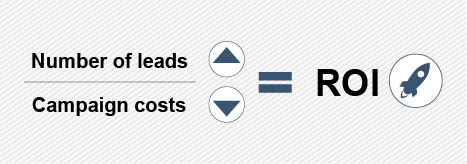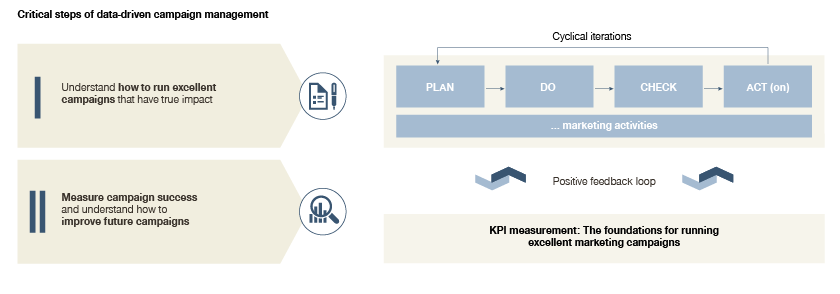Too little planning means too much waste: Every year, asset managers plow millions from their budgets into marketing campaigns. The problem is, because of various factors, there’s often little understanding of what marketing activities are actually needed to see success in sales. What can people in asset management do to measure the success of digital marketing and increase its effectiveness? Here are the answers.
The goal of an asset manager is to generate as high net flows as possible. Marketing’s job is to contribute to this and provide the sales team with targeted support throughout the selling process. However, particularly in the context of B2B, marketing is often neglected. Within asset management, there are two main reasons for this:
- The selling process in asset management is heavily influenced by the sales team, to the point that marketing only plays a supporting role.
- Sometimes there is an extremely long delay between when marketing initiatives are launched and when assets appear in company accounts, which makes it very difficult to attribute net flows to marketing activities.
This raises some important questions for asset managers: Which current marketing activities actually make a difference in this kind of sales-driven process? And which activities work, and which don’t?
Managing marketing campaigns: The status quo in asset management and how it needs to change
It’s difficult to answer these questions because of the nature of the selling process, which includes wide-ranging marketing activities that take place over a long period. Currently, although there is little understanding of what content has what effect on net flows, vast sums of money are spent on marketing campaigns in asset management every year.
The reasons why these marketing activities fail are as varied as the activities themselves. So, what exactly stops marketing campaigns in asset management from succeeding? What’s the difference between a poorly managed marketing campaign and an excellent one? And how should you allocate your marketing budget to get the most out of it and increase your long-term return on investment (ROI) in marketing?
Failed marketing campaigns in asset management: Reasons
The failure of marketing campaigns can often be attributed to one of these reasons:
• Marketing planning and optimization based only on assumptions
• Not generating and analyzing sufficient relevant data
• A speculative selection of customer touchpoints
• Top-down allocation of budgets based on untested hypotheses
• A fragmented marketing infrastructure
• A lack of internal direction and clearly defined responsibilities
Successfully managing marketing campaigns: Factors
Successfully managed marketing campaigns usually have these factors in common:
• Coordinated globally from the planning stage to evaluation
• The right touchpoints depending on the campaign’s aim and the current stage in the customer journey
• Fully automated data sourcing, KPI calculation, and monitoring
• Regular performance updates and campaign optimization supported by data
• Optimized budget allocation supported by data at all stages

Successful marketing campaigns in asset management: Our approach
In our view, two things must be done to increase your return on investment in marketing within asset management for the long term:
1. Understand how to run excellent marketing campaigns
- Cyclical process of planning, execution, analysis, and (re)alignment of marketing activities based on the analysis
2. Measure campaign success and understand how to improve future campaigns
- KPI measurement: the foundation of running excellent marketing campaigns
These two components reinforce each other to create a positive feedback loop.

1. Running excellent marketing campaigns
To get excellent marketing campaigns on the right track, your first task is to set out a strategic path by defining campaign goals, target customers, and touchpoints. Optimize your marketing infrastructure by assigning specific roles and clearly defining processes. Avoid work taking place in isolated silos. Global collaboration, for example using content globally instead of making the same kind of content multiple times over, increases efficiency. Ensure that marketing and sales collaborate and give each other feedback.
Based on the overarching structure, aims, touchpoints, and customer groups, you can then specify the relevant KPIs in the next step.
2. Measuring campaign success and optimizing future campaigns
Including suitable KPIs is an essential part of determining the criteria for a successful campaign and optimizing future campaigns. You need both operative and strategic KPIs that allow you to compare a campaign’s output to its input, identify strengths and weaknesses within campaigns, and evaluate how the marketing budget is used. Once the KPIs have been established, continual A/B testing helps you learn valuable lessons you can apply from one campaign to the next.
Remember, measure KPIs consistently across markets and campaigns. Use comparable content across the different regions you operate in and measure the success of a touchpoint or campaign consistently across them all so that you can reach valid conclusions on the regional differences. If you don’t, it’s impossible to compare the KPIs within a benchmark database and use that data to optimize the marketing measures.
Conclusion: Effective marketing is a structured process supported by data, not just assumptions
Marketing that is based on assumptions doesn’t lead to success in the long term. Effective marketing is a structured process based on reliable data and facts. To measure its success, marketing needs the right KPIs and an overarching strategy, as well as well-developed processes for optimizing campaigns in the long term. If you organize your marketing efforts in asset management this way, you can put your campaigns on the path to success, improve the process of allocating budgets based on hard facts, and significantly increase your return on investment. So, what are you waiting for?








